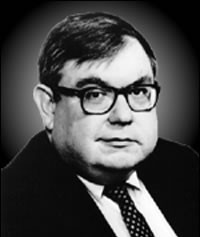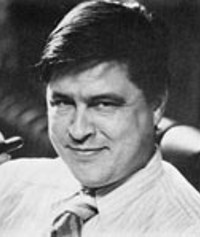 Samuel T. Francis
Samuel T. Francis
Championing
Western Civilization
and the great legacies of
Sam Francis and Joe Sobran
and their allies
 Joseph Sobran
Joseph Sobran
FGF E-Package
Samuel Francis Classics
May 13, 2008
Where The New Right Is — And Isn't
by Sam Francis
Fitzgerald Griffin Foundation
Ideas Have Consequences is the title of a 1948 book by conservative thinker Richard Weaver that in recent years has become a kind of slogan for movement conservatives trying to convince themselves and their financial angels that their beliefs have triumphed at last. The lesson we learn from a recent New York Times article on the "post-Buckley" right is that Professor Weaver was quite wrong: Ideas -- his, at least -- have no consequences. That has to be the conclusion of anyone familiar with the ideas Weaver and similar conservative heavies emitted in the years after World War II down through the 1970s. The survival of these thinkers' and writers' legacy has been open to doubt ever since the neo-conservatives arrived to share the benefits of their wisdom with real conservatives, but today, when even the elder neo-cons are fading, the situation is bleaker still.
"Conservative is a word that is almost meaningless these days," one
young rightist, Caleb Stegall, interviewed by the Times, announces.
He's entirely correct, but to judge from the article, he and his comrades
are helping to keep it that way. Mr. Stegall is part of a new web site
called newpantagruel.com, which The Times describes as "conservative
but irreverent" (I guess the two don't usually mix) and "about
religion and politics." Later we learn from Mr. Stegall that "If
I could sum up what we
stand for in one word, it would be sustainability." Huh? The
Times feels the need to clarify that "he meant theologically
conservative views on sustaining family life as well as typically liberal
views on sustaining the environment and local communities and helping
the poor." Noble causes all, no doubt, but exactly why they are
conservative is never clear.
Yet another post-Buckleyite pops up at the Weekly Standard, the official voice of Bill Kristol and the neo-cons. Eric Cohen, at the hoary age of 26, is not only a Standard contributor but, among other achievements, also "director of the biotechnology and American democracy program at the Ethics and Public Policy Center in Washington," an establishment neo-con outfit that has been around for years.
Mr. Cohen's deathless contribution to post-Buckelyism is that "conservatives needed to accept an active role for government in dealing with advancing technology, whether in the form of terrorists' weapons abroad [we tried that, if you recall] or attempts to change the nature of life at home." Mr. Stegall then assured The Times "he shared Mr. Cohen's support for government social programs, but for religious reasons."
One idea of real conservatism is that post-New Deal government was far too big and needed to be reduced. That idea seems to have been dropped into File 13 by the post-Buckley geniuses. No consequences there.
The article continues, discovering unsung young post-Buckelyites thither and yon, and virtually nowhere does a single one offer any idea that bears much resemblance to what has been called "conservatism" in this country for the last 50 years. Only Daniel McCarthy of the American Conservative utters anything like such a brainstorm.
Calling for a return to the "so-called isolationist and noninterventionist right," Mr. McCarthy affirms forthrightly, "America is a nation state. It is not meant to be a sort of world government in embryo, not meant to be a last provider of justice or security for the entire world."
As for the war in Iraq, only Mr. McCarthy openly expresses opposition to it. Mr. Cohen, as you might for some reason guess, is all for the war and isamong those who "argue that the United States may need to become more active, not less."
Nor do the post-Buckleyites seem to have much to say about the "culture war," nor most any other real problem that confronts the real world today and which most pre-Buckley conservatives have traced to liberalism and pseudo-conservatism: cultural collapse, mass immigration, racial revolution, the war on the middle class, the future of the nation state, and the emergence of democratic totalitarianism in our own societies.
The Times of course is delighted to uncover a crowd of "conservatives" who offer no threat whatsoever to the dominant liberalism it regurgitates in its pages every day, but if it wanted to find them, there's a real post-Buckley — we might even say a post conservative — right out there.
What the real new right is talking about is not making government
bigger or cryptic catchwords like "sustainability" but the
problems the Times' favorite conservatives won't mention.
You can find them not only in the American Conservative but also at
Chronicles, The Occidental Quarterly,
American Renaissance, the Citizens Informer, Middle American News, and Vdare.com. Not all their writers
and editors agree with each other, and neither the Times nor the post-Buckley
kids it's pushing would care for
them, but the ideas you find there might actually some day have some
consequences.
[This column was originally published July 23, 2004]
Back to Samuel Francis Classics archives
The Samuel Francis Classics are copyright @ 2025
by the Fitzgerald Griffin Foundation, www.fgfbooks.com.
All rights reserved.
Political pundit Samuel Francis was an author and syndicated columnist. A former deputy editorial page editor for THE WASHINGTON TIMES, he received the Distinguished Writing Award for Editorial Writing from the American Society of Newspaper Editors in both 1989 and 1990.
SHOTS
FIRED: SAM FRANCIS ON AMERICA'S CULTURE WAR, a collection of some
of Mr. Francis' writing and speeches,
was published by FGF Books, a division of the Fitzgerald
Griffin Foundation.
To sponsor the FGF E-Package, please send a tax-deductible donation to the:
Fitzgerald Griffin Foundation
344 Maple Avenue West, #281
Vienna, VA 22180
1-877-726-0058
publishing@fgfbooks.com
Or call us toll-free at 1-877-726-0058